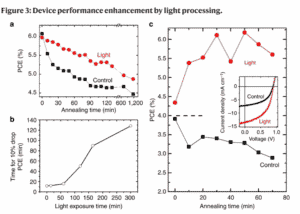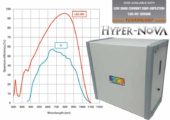Zhe Li, Him Cheng Wong, Zhenggang Huang, Hongliang Zhong, Ching Hong Tan, Wing Chung Tsoi, Ji Seon Kim, James R. Durrant & João T. Cabral
Abstract
A key challenge to the commercialization of organic bulk heterojunction solar cells is the achievement of morphological stability, particularly under thermal stress conditions. Here we show that a low-level light exposure processing step during fabrication of blend polymer:PC60BM solar cells can result in a 10-fold increase in device thermal stability and, under certain conditions, enhanced device performance. The enhanced stability is linked to the light-induced oligomerization of PC60BM that effectively hinders their diffusion and crystallization in the blend. We thus suggest that light processing may be a promising, general and cost-effective strategy to optimize fullerene-based solar cell performance. The low level of light exposure required suggests not only that this may be an easily implementable strategy to enhance performance, but also that light-induced PC60BM oligomerization may have inadvertently influenced previous studies of organic solar cell device behaviour.

A fluorescent lamp was used as the light source, with light intensity and spectrum measured by a StellarNet EPP2000 spectrometer. Blend film morphology was observed by a reflection …





